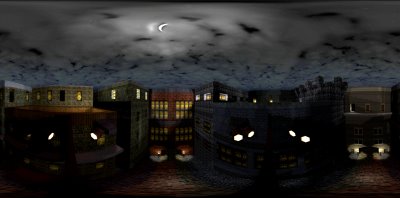The City, Dayport

Day 1 (The Metal Age)
I'm often bothered by how insular the populations I visit can be. The denizens of The City are especially bad: they've so completely forgotten that anything exists beyond the city they live in that they now merely call it The City. In fact, it's unclear to me whether anything at all remains beyond The City's borders: I haven't managed to find a way out of it.
Fortunately, The City has plenty to keep it interesting. It's a steampunk town with an thriving criminal population and a corrupt government. In the panorama above, I'm touring the city in what astute visitors tell me is the only way to really appreciate it: via the rooftops. Of course, this is largely motivated by the criminality of my host and the severity of current patrols. I'd tour the city at ground level if doing so was somewhat less dangerous.
This brings me to the topic that brought me back to The City: criminal tourism. Back in reality, we hear tell of thrill-seekers who travel in dangerous parts of the world, but there doesn't really appear to be a market for tourism driven by explicitly criminal activity (unless you want to include "sexual tourism," which is still somewhat relevant to the point I am trying to make). In artificial worlds, however, legality is not a concern. In fact, the wish-fulfillment elements seen in world design suggest that few things are as exciting as pretending to be a skilled criminal (in the case of The City, a thief).
In The City, outsiders can dive into a criminal world without real-world risk, pitting their intelligence against the security of well-fortified structures to accomplish difficult heists. This particular practice, at its most refined, is a combination of wit, luck, and caution, as 'experts' look down on the use of violence. A skilled thief, they assert, is one who causes no casualties, because killing the security simply make them into murderers, who are a dime-a-dozen.
But many, many virtual worlds exist to facilitate revelry in one form of criminal activity or another. Often, people travel to exotic virtual worlds to engage in violent crimes that, being virtual, have no real victims. Most travelers of this sort enthusiastically harm others (even the innocent) within the context of that world, even though real-world physical violence is anathema to them. Other worlds embrace other criminal activities (examples include drug-smuggling, blackmail, organized crime,vigilantism , and that oldest of professions, prostitution), and a similar suspension of real-world rules within the virtual world applies to those as well.
Does this turn these virtual tourists into real world criminals? That seems unlikely. The fact is that very, very few of the worlds on the new periphery that are open to the public have serious consequences for illegal activity. With no real victims and no real consequences, "illegal" ceases to be a label that carries any weight. Whether deterred by the threat of law enforcement or the desire not to harm others, most law-abiding citizens are able to enjoy at least some criminal activities if those risks are removed.
As an aside, the same reasoning is often used to justify "soft crime" such as shoplifting. This is a misguided view, since it generally relies on (a) pretending that small harm is somehow equivalent to no harm and (b) a low likelihood of getting caught is not the same as having a minor penalty. Knowing people in corrections, I can assure you that being caught shoplifting can have a major effect on your life.
My last visit to The City's so-called "Metal Age" was a whopping six years ago, and the city really hasn't held up very well. While still a thrilling experience and one I heartily recommend , it's not so easy on the eye as it once was, and I may not be able to find too many panorama-worthy sites. I'll likely spend a week or so touring this time period, but it is only after the close of the Metal Age that the city was refurbished and restored to its full potential. Consequently, I don't expect I'll be devoting too much space to its re-exploration.

0 Comments:
Post a Comment
<< Home